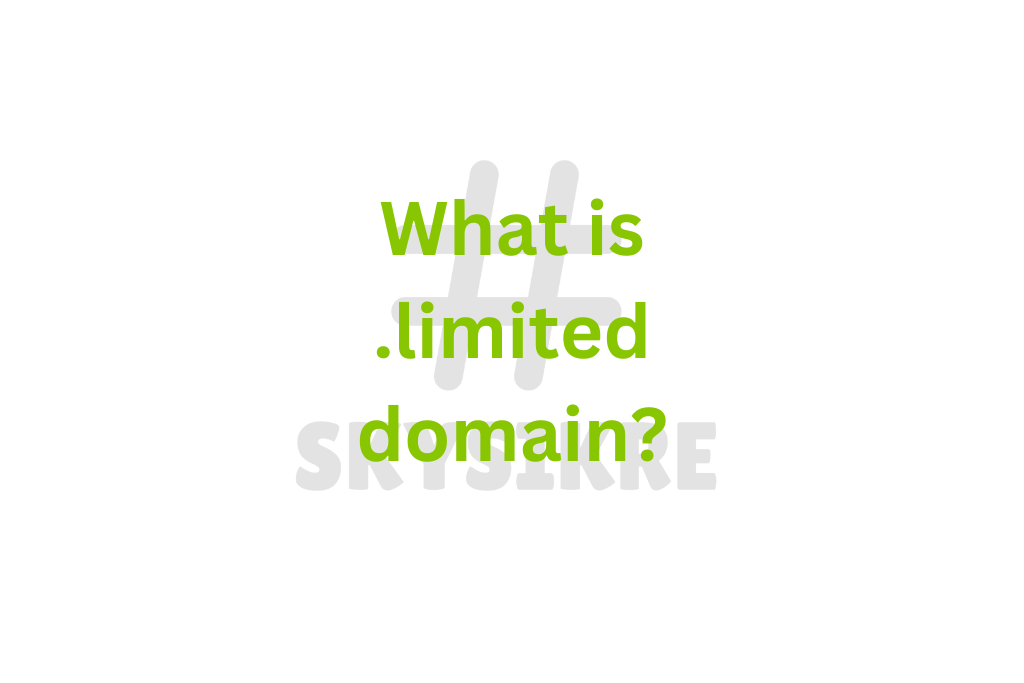Introduction to Limited Domains
In the rapidly evolving digital landscape, domain names play a crucial role in establishing identity and accessibility for websites. Among the various types of domain names, .limited domains have emerged as a distinct category, designed to cater to specific user needs and functionalities. Unlike traditional domain extensions such as .com or .org, which are generally available to anyone, limited domains present a more exclusive option for businesses and organizations.
.limited domains serve to indicate restricted or specialized usage, often associated with entities that have specific criteria for membership or recognition. This exclusivity can enhance brand credibility, as it signals to visitors that the organization adheres to a particular set of standards or operates within a defined scope. For instance, a company might opt for a .limited domain to signify its focus on niche markets, helping to differentiate itself from competitors who use more common domain extensions.
Moreover, the utility of .limited domains extends beyond branding; they provide organizations with the opportunity to establish a presence that aligns with their business model or service offering. The registration process for these domains is typically more stringent, allowing organizations to assert control over their domain space and protect their brand identity. By utilizing a .limited domain, businesses can foster trust among their audience, which is increasingly important in a saturated online marketplace.
In summary, .limited domains represent a notable evolution in the world of domain names, offering organizations a specialized avenue to reinforce their brand positioning and enhance user engagement. As businesses navigate the complexities of online visibility, understanding the significance of such domains can contribute to strategic decision-making regarding their digital presence.
What Is a .limited Domain?
A .limited domain represents a specific type of Internet domain that is designed for use by organizations, particularly those that limit their operations or the scope of their activities. This categorization is part of the broader domain name system (DNS) that helps identify and classify web entities. The .limited domain extension is particularly relevant for entities that operate under certain constraints or wish to emphasize their specialized focus within a competitive market.
For a domain to be categorized as .limited, it must adhere to specific criteria set by the domain registration authorities. Typically, organizations that utilize this domain are those that aim to convey an idea of exclusivity or constraint, such as limited liability companies (LLCs) or other organizations that want to underscore their limited operational scope. This structured naming convention offers a clear signal to users about the nature of the business or group behind the website, making it easier for visitors to understand what to expect.
Examples of entities that would benefit from a .limited domain include professional services firms, various types of startups, and businesses that operate within niche markets. These entities often aim to create a professional web presence while establishing a recognizable brand identity. The .limited domain can prove advantageous in improving search relevance within specific industries, as it naturally aligns the domain name with the organization’s operational reality. Furthermore, the usage of this domain extension can contribute to building trust and credibility among potential clients and stakeholders, as it signifies a structured and legally recognized organizational framework.
The Purpose of .limited Domains
The introduction of the .limited domain has significantly influenced the digital landscape, providing organizations and individuals with unique branding opportunities. One of the primary purposes of .limited domains is to establish a clear identity in an increasingly crowded online environment. With traditional domain extensions becoming less distinctive, .limited offers a significant advantage in terms of branding. It allows individuals and businesses to convey their exclusivity and specialized focus effectively, making it easier for potential clients and customers to understand the nature of their offerings.
The concept of exclusivity is another crucial aspect driving the adoption of .limited domains. By utilizing this particular extension, organizations can signal to their audience that their services or products are exclusive in nature or available to a select group. Such a designation might appeal to clients looking for bespoke services, thus enhancing their competitive edge in their respective markets. This exclusivity can foster a sense of trust and prestige, as consumers often associate limited offerings with quality and high value.
Moreover, there are legal implications associated with .limited domains that organizations need to consider. For companies operating under limited liability structures, using a .limited domain can reinforce their legal standing and corporate identity. This domain extension serves as a digital representation of the business’s limited liability status, offering clarity and transparency to stakeholders. Consequently, this can aid in building a reputable online presence, as it helps distinguish formal businesses from other informal entities in the digital space.
In summary, the .limited domain serves multifaceted purposes, promoting branding and exclusivity while also emphasizing legal significance for organizations. Its strategic use can significantly impact how businesses position themselves in the market, ensuring they stand out in a competitive environment.
Benefits of Using .limited Domains
The emergence of .limited domains has provided businesses and organizations with a robust option for enhancing their online presence. One of the primary advantages of utilizing .limited domains is their ability to improve online visibility. By adopting a distinct domain extension, companies can differentiate themselves from their competitors. This differentiation can lead to increased recognition and search engine optimization (SEO) advantages, as search engines often favor unique and relevant domain names. A .limited domain can create an impression of exclusivity that may set a business apart within a crowded online marketplace.
Another significant benefit of .limited domains is the establishment of a clear identity. In today’s digital landscape, it is essential for brands to convey their purpose and values effectively. A .limited domain can signal to potential customers that the business operates within specific parameters, such as niche markets or specialized services. This clarity helps consumers quickly identify the focus of the brand, ultimately leading to more meaningful engagements. The domain extension can serve as a simple yet powerful descriptor of a company’s intentions, providing immediate context for users.
Furthermore, utilizing a .limited domain can lend credibility and trust to an organization. In a world where consumers increasingly scrutinize online entities, having a well-chosen domain extension can foster confidence. A .limited domain suggests a level of professionalism and seriousness, signaling that the organization is committed to its mission and values. This perception can encourage potential customers to engage further, whether it’s through purchasing products, signing up for newsletters, or following on social media platforms. Overall, the strategic use of .limited domains can serve as a vital tool in establishing a reputable digital identity.
Limitations of .limited Domains
The introduction of .limited domains brings with it a set of limitations that potential users should consider. One of the primary drawbacks is the restrictions imposed on their usage. Unlike more conventional domain extensions, the .limited domain is typically designated for specific types of organizations or business structures, often requiring proof of eligibility. This can pose challenges for businesses seeking flexible online presence options. Those who do not meet eligibility criteria might find themselves unable to acquire a .limited domain, thus missing out on the potential branding advantages it offers.
Additionally, the financial aspect of .limited domains can be a deterrent. The costs associated with acquiring and maintaining these domains can be significantly higher than those for more common extensions like .com or .org. Businesses must weigh the benefits of a specialized domain against the potential financial burden it could impose over time. The initial registration fees and subsequent renewal costs may affect the overall budget, especially for startups or small enterprises that are often constrained by limited resources.
Another key concern is the potential for confusion stemming from an extensive array of domain options. As .limited domains proliferate, chances for misunderstanding or miscommunication increase. Users may inadvertently confuse .limited with similar-sounding domain extensions or established ones like .com. This can lead to issues with brand recognition and online visibility as users struggle to remember which domain they encountered. Finally, the technical management of .limited domains can be more complex than that of traditional domains. Organizations may require specialized IT support to navigate administrative tasks, which adds another layer of complexity for users unfamiliar with the nuances of these domain structures.
Key Industries Utilizing .limited Domains
The .limited domain has emerged as a popular choice among various industries that aim to convey exclusivity and specificity in their online presence. One of the primary sectors harnessing the power of .limited is the finance and investment industry. Companies in this sector utilize .limited domains to signify trust and professionalism. By adopting a .limited domain, these firms can emphasize their commitment to compliance and regulatory standards, establishing themselves as reliable partners for investors and stakeholders alike.
Another prominent industry leveraging .limited domains is the technology sector. Startups and tech firms often use these domains to showcase their streamlined services or products that cater to a selected clientele. This strategic use of .limited helps distinguish innovative solutions in a saturated market, allowing businesses to create a distinct identity that resonates with target audiences. A notable example is a software company that focuses on providing exclusive features for its premium clients, effectively using a .limited domain to reflect its niche approach.
Similarly, the e-commerce landscape finds value in .limited domains, particularly among businesses that offer limited edition or collectible items. Retailers that employ this domain extension can effectively convey the uniqueness of their offerings. This creates a sense of urgency and exclusivity among consumers. For instance, an online boutique may utilize a .limited domain to designate a specific line of high-end fashion items, thus appealing to consumers looking for distinctive products that are not widely available.
Lastly, the entertainment and creative industries also benefit from .limited domains. Filmmakers, artists, and musicians often capitalize on this domain extension to promote exclusive content, limited experiences, or special editions of their work. By using a .limited domain, these creators can emphasize their commitment to providing a curated experience, appealing to audiences who value unique artistic expressions.
The Future of .limited Domains
As the digital landscape continually evolves, the significance of .limited domains is expected to expand in tandem with emerging technologies and consumer trends. The rise of the internet has transformed how businesses and individuals communicate, making domain names a vital component of online identity. In the coming years, we may witness notable innovations in the domain industry that enhance user experience and streamline domain management. Automated systems for domain registration and renewal could become commonplace, simplifying the process for users and businesses alike.
Technological advancements such as artificial intelligence and machine learning may also play a pivotal role in shaping the future of .limited domains. These technologies can evaluate consumer behavior and preferences in real-time, enabling more tailored domain suggestions and personalized marketing tactics. Furthermore, with the increasing importance of data privacy and security, .limited domains may incorporate advanced security protocols to mitigate risks associated with cyber threats, thereby gaining increased trust from users.
Predictions indicate that as more entities seek a unique online presence, the demand for .limited domains may significantly increase. These domains present a clear and concise identity that appeals to businesses aiming to convey exclusivity or specialization within their niche. The concept of artificial scarcity associated with .limited domains could make them a sought-after asset, driving speculation and investment in these names.
Moreover, as sectors such as eCommerce and digital services continue to expand, we may observe a rising trend of companies adopting .limited domains to emphasize a focus on limited offerings or bespoke services. This aligns with consumer expectations for personalized experiences in an increasingly competitive market. Overall, the future of .limited domains is characterized by technological integration, an enhanced emphasis on exclusivity, and a growing role in the digital economy.
Comparing .limited Domains with Other Domain Extensions
When navigating the world of online presence, selecting the right domain extension is essential. This choice significantly influences brand perception, visibility, and audience engagement. The .limited domain, while relatively new, offers unique advantages compared to more established domain extensions such as .com, .org, and various generic top-level domains (gTLDs).
The .com domain extension is arguably the most recognized globally, making it a default choice for many businesses and individuals. However, the saturation of .com domains means that securing a desired name can often be challenging. In contrast, .limited domains provide a fresh alternative for entities wishing to convey a specific nature of operation, particularly those engaged in limited partnerships or services. This specificity can attract targeted demographics, enhancing relevance and clarity in branding efforts.
On the other hand, .org is predominantly associated with organizations, especially non-profits. Utilizing .org can signal a commitment to social causes or community engagement. While similar in its focused approach, a .limited domain emphasizes a business model and operational framework, differentiating it from the .org’s nonprofit affiliation. This distinction can be crucial for companies looking to convey a professional image while still indicating their operational constraints.
Moreover, newer gTLDs have emerged, offering additional choices tailored to specific industries or interests, such as .tech for technology-focused companies or .store for e-commerce businesses. While these gTLDs offer flexibility, a .limited domain explicitly highlights the nature and structure of the business. By adopting a .limited extension, businesses can position themselves distinctly in a crowded digital landscape, generating interest among potential clients who value transparency in business operations.
In conclusion, the choice between .limited and other domain extensions should be informed by the brand’s identity, target audience, and operational structure. While .com remains popular, and .org serves charitable entities well, the .limited domain is particularly suited for businesses keen on highlighting their specific operational framework. This strategic selection aids in building a recognizable and trustworthy online presence, fostering long-term client relationships.
Conclusion: Is a .limited Domain Right for You?
Choosing the right domain extension is crucial for establishing a strong online presence. The .limited domain is designed to cater to specific types of organizations, often emphasizing exclusivity and constraint. This extension is particularly suitable for businesses that want to signal their status as limited partnerships, corporations, or other entities that are subject to specific regulations and guidelines. In this concluding section, we will address the considerations that should guide your decision-making process regarding the adoption of a .limited domain.
One of the primary advantages of using a .limited domain is its ability to convey professionalism and credibility. By aligning your online identity with this domain extension, you may attract more discerning clients who are looking for a business with a serious commitment to quality and service. Furthermore, the .limited extension can help differentiate your brand within a crowded marketplace, setting your organization apart from competitors that utilize more common domain endings.
However, before opting for a .limited domain, it is essential to consider your target audience and business model. If your organization operates on a global scale or serves a diverse client base, a .limited domain may inadvertently restrict your perceived reach. Additionally, exploring variations or other domain extensions that resonate better with your desired branding strategy may also be a prudent step. It is vital to analyze how such a choice aligns with your long-term growth objectives and marketing initiatives.
Ultimately, selecting a .limited domain requires careful consideration of the nuances it presents. By reflecting on the unique qualities of your organization, the expectations of your audience, and the competitive landscape, you will be better equipped to determine whether a .limited domain is indeed the right fit for your online presence.






